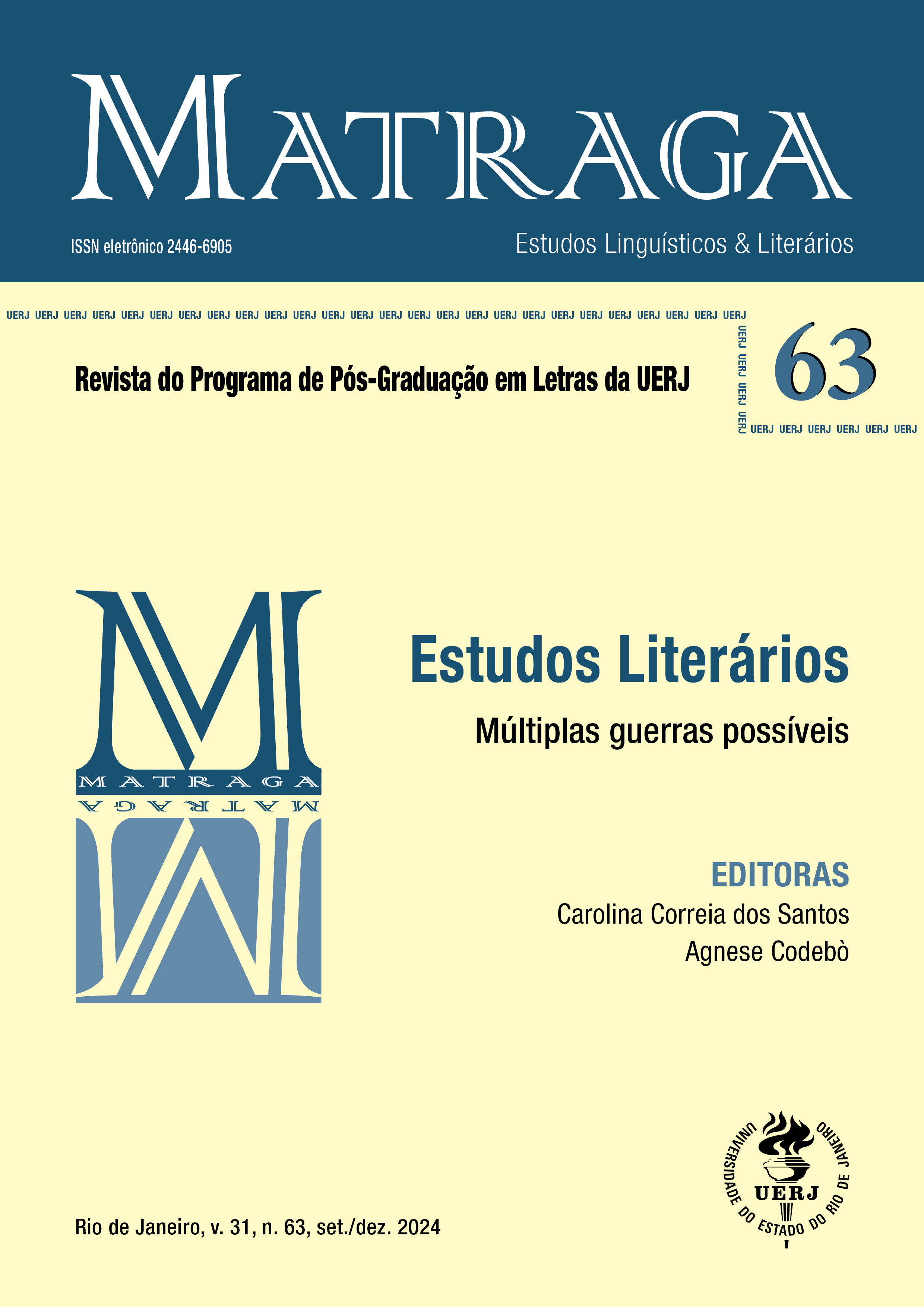Kafka on the Battlements: Fighting the Great War in “The Great Wall of China”
DOI:
https://doi.org/10.12957/matraga.2024.85062Palavras-chave:
Primeira Guerra Mundial, Nacionalismo, Choque pós guerra, Bem-estar, IntraduzibilidadeResumo
Kafka nas batalhas: Lutando na Grande Guerra na “Grande Muralha da China”
Este artigo avalia “Na construção da Grande Muralha da China”, de Franz Kafka, de 1917 (Beim Bau der Chinesischen Mauer) e o fragmento relacionado “Um Manuscrito Antigo” (Ein Altes Blatt) em relação à Primeira Guerra Mundial. A história de Kafka fornece um prisma até agora negligenciado sobre o tema – e, portanto, oferece também uma nova forma de conceptualizar e falar sobre o lugar da guerra na obra de Kafka e na literatura modernista em geral. Mais especificamente, o artigo centra-se em três formas pelas quais “Na Construção da Grande Muralha da China” refrata a guerra: através da sua tematização da força nacionalizadora do militarismo; através das suas relações com os escritos de Kafka sobre o trauma da guerra; e no tratamento de erros de tradução e conflitos linguísticos. Normalmente, Kafka foi enquadrado como não tendo investido na guerra. Como este artigo demonstra, o trabalho de Kafka esteve inevitavelmente envolvido de formas complexas com o conflito, tanto de forma patriótica como crítica.
-----
Original em inglês.
Downloads
Referências
ADORNO, Theodor. “Notes on Kafka”. In: Prisms. trans. by Samuel and Shierry Weber. Cambridge, MA: MIT Press, 1981, p. 243-270.
ANDERSON, Benedict. Imagined Communities: Reflections on the Origin and Spread of Nationalism. London: Verso, 1983.
APTER, Emily. The Translation Zone: A New Comparative Literature. Princeton: Princeton University Press, 2006.
BECHER, Peter; HÖHNE, Steffen; NEKULA, Marek. (eds.) Kafka und Prag: Literatur-, kultur-, sozial- und sprachhistorische Kontexte. Cologne: Böhlau, 2012.
BENJAMIN, Walter. Franz Kafka: Beim Bau der Chinesischen Mauer trans. Rodney Livingstone. In: Walter Benjamin: Selected writings part II, vol 2, 1931-1934. Cambridge, MA and London, England: Harvard Uni¬versity Press, 1999, p. 494-500.
BUZZATI, Dino. Il Deserto dei tartari. Milan: A. Mondadori: 1945.
CLAUSEWITZ, Carl von. On War. trans. Michael Howard. New Jersey: Princeton University Press, 1984.
CORNGOLD, Stanley, GREENBERG, Jack; WAGNER, Benno. Commentary. In: Kafka, 2009.
CORNWALL, Mark. “The First World War”. In: Franz Kafka in Context. Ed. Carolin Duttlinger. Cambridge, United Kingdom; New York, NY: Cambridge University Press, 2018.
DELEUZE, Gilles; GUATTARI, Félix. Kafka: Toward a Minor Literature. Trans. Dana Polan. Minneapolis: University of Minnesota Press, 1986.
ENGEL, Manfred; ROBERTSON, Ritchie. (eds.). Kafka, Prag und der Erste Weltkrieg / Kafka, Prague and the First World War. Würzburg: Königshausen & Neumann, 2012.
FREUD, Sigmund. Beyond the Pleasure Principle. Trans. C.J.M. Hubback. London: Hogarth Press, 1922.
GOEBEL, Rolf J. Constructing China: Kafka’s Orientalist Discourse. Columbia, SC: Camden House, 1997.
HAŠEK, Jaroslav. The good soldier Švejk and his fortunes in the World War. Trans. Cecil Parrott. New York: Crowell, 1974.
HSIA, Adrian. ed. Kafka and China. Bern; New York: P. Lang, 1996.
KAFKA, Franz. Sämtliche Erzählungen. Frankfurt am Main: Fischer, 1995.
KAFKA, Franz. The Complete stories. New York: Schocken, 1998.
KAFKA, Franz. The Office Writings, ed. Stanley Corngold, Jack Greenberg, and Benno Wagner; trans. Eric Patton with Ruth Hein. Princeton, N.J: Princeton University Press, 2009.
KAFKA, Franz. A Hunger Artist and Other Stories. Trans. Joyce Crick. New York: Oxford University Press, 2012.
KAFKA, Franz. Letters to Friends, Family, and Editors. Trans. Richard and Clara Winston. New York, Schocken, 2016.
KAFKA, Franz. The Diaries. Trans. Ross Benjamin. New York: Schocken, 2022.
MENG, Weiyan. Kafka und China. München: Iudicum-Verlag, 1986.
MUIR, Edwin. Introduction to The Great Wall of China. In: Franz Kafka: Description of a Struggle and The Great Wall Of China. London: Secker and Warburg, 1933, p. 9-16.
NEKULA, Marek. Franz Kafka and His Prague Contexts. Prague: Karolinum, 2016.
NEUMANN, Bernd. Franz Kafka und der Große Krieg. Eine kulturhistorische Chronik seines Schreibens. Würzburg: Königshausen & Neumann, 2014.
RIBÓ, Ignasi. “At the farthest pole from man”: Kafka’s posthuman outlook on war”. Journal of Modern Lite¬rature, 44.1, Fall 2020, p. 20-35.
ROJAS, Carlos. Writing on the wall: Benjamin, Kafka, Borges, and the Chinese imaginary. 452°F. #13 (2015), p. 71-81.
SAINT-AMOUR, Paul. Tense Future: Modernism, Total War, Encyclopedic Form. Oxford: Oxford University Press, 2015.
STACH, Reiner. Kafka: The Years of Insight. Trans. Shelley Frisch. Princeton: Princeton University Press, 2013.
WAGENBACH, KLAUS. Franz Kafka. Rowohlt Verlag, 1964.
WOOD, Michael. Kafka’s China and the Parable of Parables, Philosophy and Literature, Volume 20, Issue 2, 1996, p. 325-337.
WOODS, Michelle. Kafka translated: How Translators Have Shaped Our Reading of Kafka. New York: Bloomsbury, 2014.
WOOLF, Virginia. Three Guineas. Hoboken, NJ: Wiley-Blackwell, 2001.
ZENG, Yanbing. Franz Kafka and Chinese Culture Trans. Yuan Li. Singapore: Palgrave Macmillan, 2022.
Downloads
Publicado
Como Citar
Edição
Seção
Licença

Este trabalho está licenciado sob uma licença Creative Commons Attribution-NonCommercial 4.0 International License.
AUTORIZAÇÃO
A Matraga – Revista do Programa de Pós-Graduação em Letras da UERJ está autorizada a publicar o artigo ora submetido, caso seja aceito para publicação online. Fica atestado que a contribuição é original, que não está sendo submetida a outro editor para publicação, e que a presente declaração é a expressão da verdade.
Os trabalhos publicados no espaço virtual da Matraga – Revista do Programa de Pós-Graduação em Letras da UERJ serão automaticamente cedidos, ficando os seus direitos autorais reservados à Matraga. Sua reprodução, total ou parcial, é condicionada à citação dos autores e dos dados da publicação.

A Matraga utiliza uma Licença Creative Commons - Atribuição-NãoComercial 4.0 Internacional.





